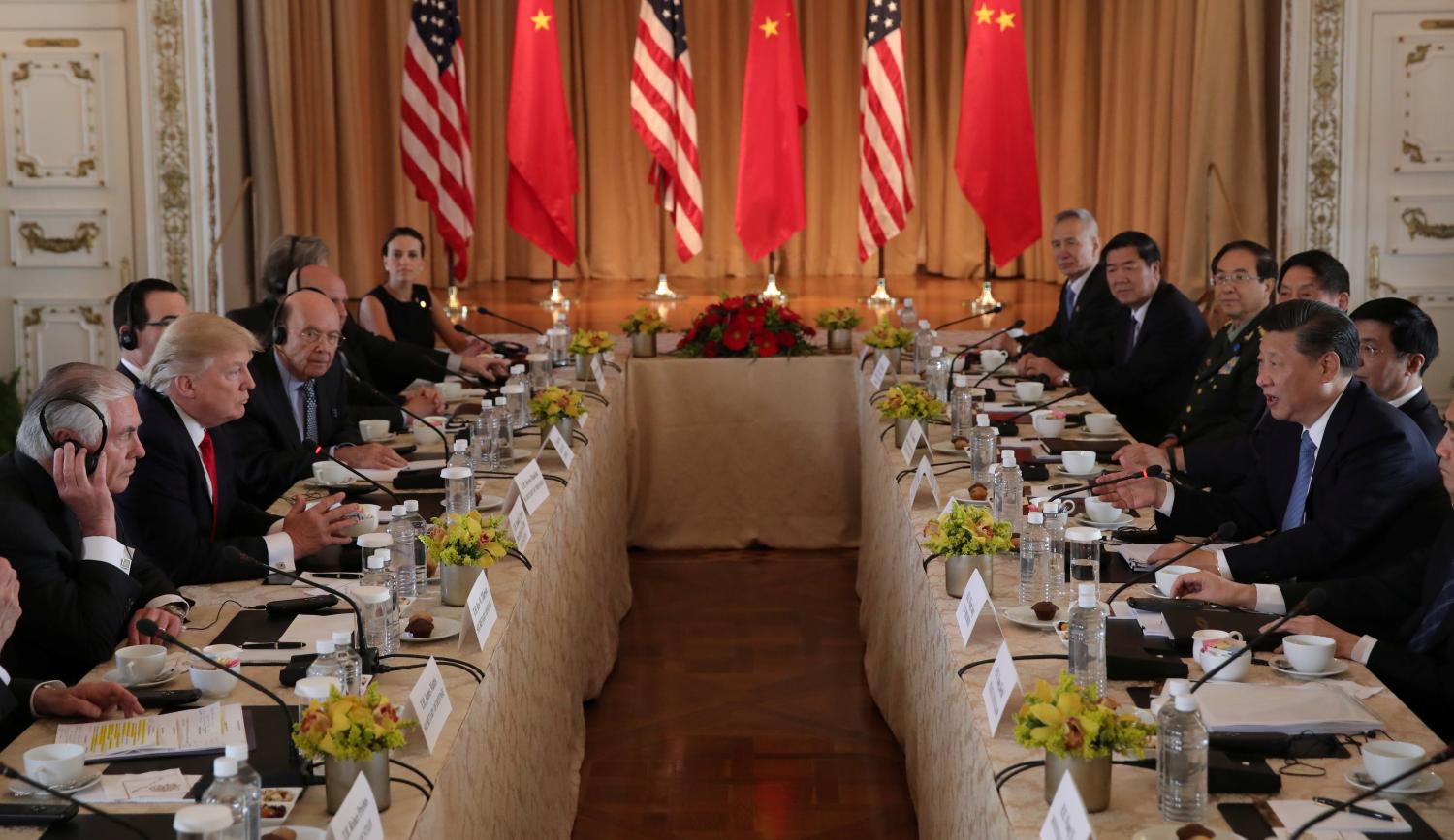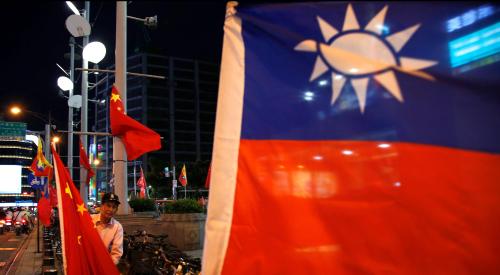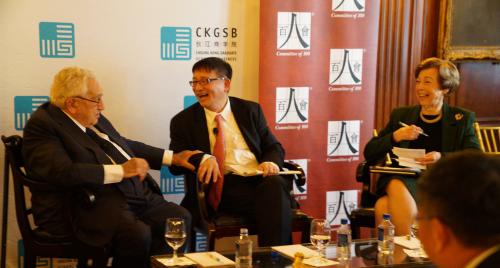Content from the Brookings-Tsinghua Public Policy Center is now archived. Since October 1, 2020, Brookings has maintained a limited partnership with Tsinghua University School of Public Policy and Management that is intended to facilitate jointly organized dialogues, meetings, and/or events.
The news that President-elect Trump has spoken by phone to Taiwan’s President Tsai Ing-wen as part of the series of congratulatory calls on his election heightens concerns about Trump’s foreign policy deftness. There are serious risks posed by his failure to take briefings by government professionals, and he appears to have little respect for the potential damage of actions taken without understanding long-standing U.S. national security concerns.
The backstory
Since the establishment of diplomatic relations between the United States and the People’s Republic of China (PRC) in 1979, no U.S. president or president-elect has had a face-to-face or telephone conversation with his Taiwan counterpart. This was an implicit part of the arrangement Washington accepted when it recognized the PRC as the sole legal government of all of China and agreed to conduct its relations with Taiwan on an unofficial basis.
Over the years, there have been tactical adjustments to ensure that U.S. officials can interact with Taiwan counterparts to pursue and protect our interests and to show proper respect for Taiwan and its democracy. However, our top-level officials—particularly the president—have always shown great care not to upset the post-1979 arrangements. There have been quiet, non-visible written communications between the top leaders of the United States (including presidents and presidents-elect) and Taiwan, but it has always been understood that direct conversations would cross a line not worth challenging.
China’s claim to Taiwan is, and has long been, the most sensitive issue in U.S.-China relations. It was the principal obstacle to our getting together with Beijing before President Nixon’s 1972 trip, and negotiation of how to handle the issue—the handiwork of Presidents Nixon and Carter and Secretary Kissinger, Secretary Vance, and National Security Advisor Brzezinski—was the central feature of the three Joint Communiques laying the basis for our relationship. On every aspect of the U.S. relationship with Taiwan—whether it be U.S. arms sales to Taiwan, high-level meetings, military-to-military contacts, visits by senior officials, transits of the United States by Taiwan leaders, or bilateral U.S.-Taiwan agreements—there is a long history about what the United States can do consistent with its commitment to an “unofficial” relationship with Taiwan. The U.S. government does not suddenly, without preparation or reflection, change essential features in a framework that has served our interests, those of Taiwan, and those of the U.S.-China relationship. And most importantly, that has kept the peace in the region.
A break with the past
Unfortunately, President-elect Trump has waded into the thicket of U.S.-Taiwan relations without any apparent briefings by senior State Department officials intimately familiar with this long history. This phone call will likely to be interpreted by Beijing as something much more than a personal chat. The Chinese, unfortunately, are likely to see this as threatening a cornerstone of the edifice on which U.S.-China relations are built. The Chinese rarely overlook what they perceive a potential alteration in U.S. policy toward Taiwan. A look back at their conduct in 1995, when they undertook ballistic military exercises that threatened Taiwan in the wake of an unprecedented U.S. invitation to Taiwan’s president to speak at Cornell University, illustrates the Chinese mindset. We may neither like nor admire this, but we cannot ignore it.
This phone call will likely to be interpreted by Beijing as something much more than a personal chat.
It is too soon to tell if the Chinese will overreact by taking steps against either Taiwan or American interests. So far, it would appear that cooler heads will prevail in Beijing. They seem to be blaming Taiwan’s leadership, rather than publicly asserting that Trump or the United States was responsible. They may judge that they should show restraint in order to avoid rocking the boat too soon in their relationship with the incoming Trump administration. That is not an experiment, however, that Trump should have conducted. It will put Beijing more on edge to react harshly to future challenges by Trump . Additionally, relations between Beijing and Taipei are especially sensitive right now, since the election of the candidate of the historically pro-independence DPP party earlier this year. That prompted Beijing to cut off political ties with Taiwan until President Tsai recognizes the “one China principle” that, under various interpretations, underlies previous contacts. President Tsai cannot do that for reasons of politics and conviction, and before the Trump-Tsai conversation there was a risk that Beijing might increase pressure on a recalcitrant Taiwan in damaging ways. That risk can only be compounded by this gratuitous phone conversation.
The triangle of interests
It is not in Taiwan’s interest to see the framework of the U.S.-PRC-Taiwan relationship fundamentally altered. Restraint across the Taiwan Strait on the part of Beijing is essential for Taiwan’s security. Arms purchased from the United States and U.S. assurances of support under the Taiwan Relations Act passed after the lapse of the U.S.-Republic of China (Taiwan) security treaty in 1980 are valuable, but Chinese continued intention to resolve cross-Strait issues peacefully is at least as important. Thumbing our noses at Beijing on its most sensitive national and security issue may feel temporarily satisfying, but provoking it when it has many cards to play makes no strategic sense. One can empathize with President Tsai’s desire to establish contact with and gain respect from the incoming U.S. president. What is incomprehensible, however, is how the incoming U.S. president could casually ignore the historic and strategic factors that all eight presidents since Nixon have understood and acceded to the call.
There are many Republican officials who understand this history well and have been involved in managing it. They know the importance of the U.S. relationship with China, with Taiwan, and how we have protected both despite the sometimes contradictory challenges. A number of them declared their opposition to candidate Trump, and wounds may be slow in healing. President-elect Trump would be well-advised, however, to reach out to this large reservoir of talent, both for advice during the transition and to staff his administration, as well as to draw on the great expertise of State Department and intelligence community officials, who have years steeped in these problems. President-elect Trump is free to disregard their advice, but it is profoundly contrary to American, and his, interest to ignore it.
The Brookings Institution is committed to quality, independence, and impact.
We are supported by a diverse array of funders. In line with our values and policies, each Brookings publication represents the sole views of its author(s).









Commentary
Trump, Taiwan, and a break in a long tradition
December 3, 2016